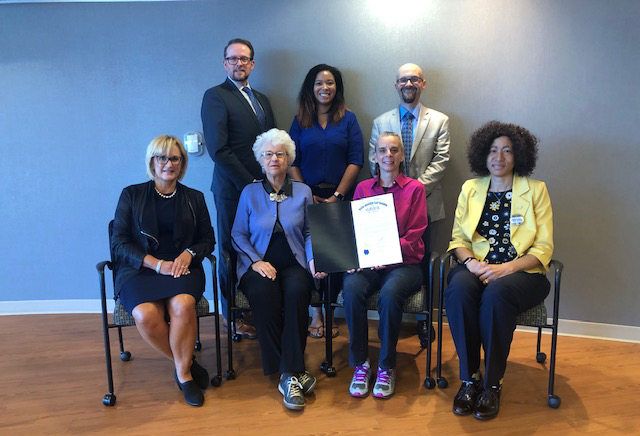‘Finding a Better U’ Developed to Help Improve Local Heart Health
Faculty at UA developed a free community outreach program to address the heart-health crisis in Summit County.
(Image via The University of Akron)
In the front row, from left, are Dr. Judith A. Juvancic-Heltzel , Dr. Mary Jo MacCracken, Dr. Carolyn Murrock and Jolene Lane. In the back row, from left, are Will Cole, Alexis Holt and Dr. Matt Akers.
November 5, 2019
Sponsored by The University of Akron Foundation and the College of Health Professions, faculty have developed the free program “Finding a Better U” (FABU) to help local residents improve their heart health starting in November 2019.
With heart disease as the No. 1 cause of death in Summit County and all over the United States, the program aims at lowering high rates of the disease and Type 2 Diabetes locally, a UA press release said.
Each week, over 100 local residents living in Akron’s AMHA apartments and Alpha Phi Alpha will have access to free exercise and nutrition classes through FABU.
UA faculty running FABU include Dr. Mary Jo MacCracken, professor of sport studies; Alexis M. Holt, exercise science assistant lecturer; Dr. Carolyn Murrock, R.N., professor of nursing; and Dr. Judith A. Juvancic-Heltzel, associate professor of exercise science.
Dr. Murrock said main risk factors for heart disease include hypertension, obesity and diabetes, which is why this program aims at helping the community combat these health issues.
“We want to do our part in combating these issues by promoting exercise and good dietary habits,” Dr. Murrock said.
Additionally, Dr. Murrock added that Summit County reports a “13.9% prevalence of Type 2 Diabetes, which is higher than the 12% average across the state of Ohio.”
FABU’s team will collect data on heart disease and diabetes from participants, as well as information on BMI, blood pressure, waist circumference, cholesterol and blood sugar levels.
This data will then be used to measure the overall effectiveness of the program in decreasing risk factors for these diseases, especially for minority adults in the area who are disproportionately affected.
FABU also gives UA students in nursing, nutrition, and sport science and wellness a chance to gain real-world experience through data collection and instruction throughout the program.












